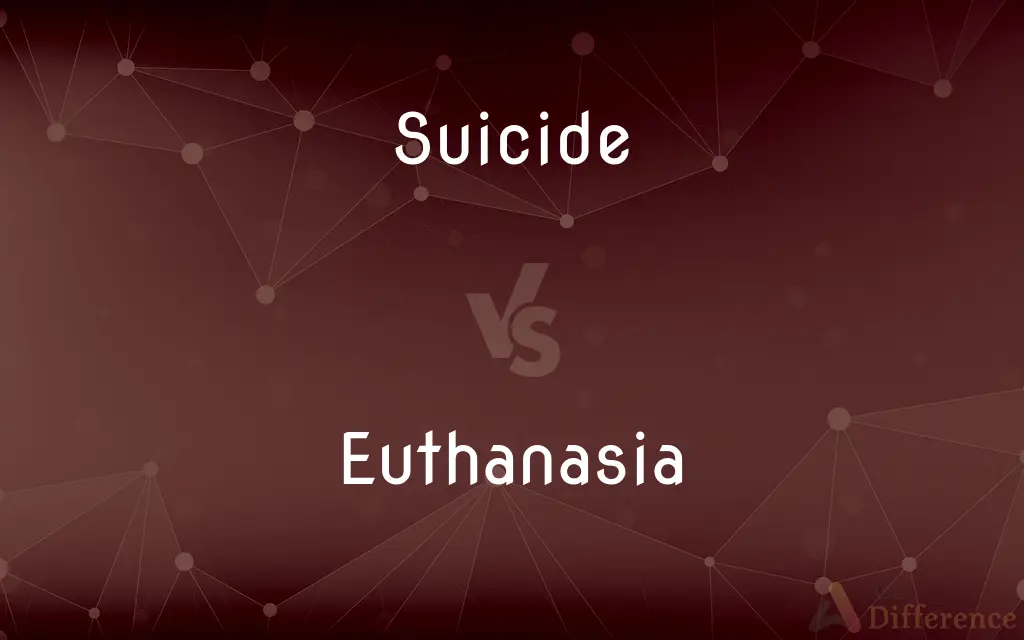Suicide vs. Euthanasia — What's the Difference?
By Tayyaba Rehman & Fiza Rafique — Updated on March 18, 2024
Suicide is the act of taking one's own life intentionally, often due to despair, whereas euthanasia involves someone else ending a person's life to relieve them from incurable diseases or suffering.

Difference Between Suicide and Euthanasia
Table of Contents
ADVERTISEMENT
Key Differences
Suicide is a complex act often driven by a variety of personal, psychological, and social factors, leading individuals to end their own lives. It's seen as a solitary decision influenced by despair, mental health issues, or unbearable circumstances. Whereas euthanasia, also known as mercy damage, involves the intervention of a third party, typically a healthcare provider, to end a patient's life. This act is intended to relieve the patient from irreversible suffering or terminal illness.
The ethical and legal implications of suicide are heavily debated, with it being considered a tragic, yet personal choice without direct legal consequences for the individual. On the other hand, euthanasia raises significant ethical, moral, and legal concerns, often requiring strict legal criteria to be met, including consent from the patient or legal proxies.
While suicide does not typically involve a formal process or approval, euthanasia, especially in jurisdictions where it is legal, follows a stringent protocol. This includes evaluation of the patient's condition, consent processes, and involvement of multiple healthcare professionals to ensure the decision aligns with legal and ethical standards.
The societal and cultural perceptions of suicide are generally negative, viewing it as a result of failed coping mechanisms or lack of support. Euthanasia, however, is often seen through a more sympathetic lens, focusing on the alleviation of suffering and the respect for patient autonomy.
The support systems for preventing suicide include mental health services, counseling, and community support initiatives aimed at addressing the underlying causes of despair. Euthanasia discussions, conversely, often involve palliative care options, ethical debates, and legal considerations, highlighting the importance of quality of life and dignity in after living.
ADVERTISEMENT
Comparison Chart
Definition
The act of intentionally causing one’s own loss by his own self.
The act of intentionally ending a life to relieve pain or suffering.
Legal Status
Legal in most places, but may lead to intervention.
Legal under certain conditions in some jurisdictions.
Involvement
Individual action.
Requires a third party, often a healthcare professional.
Ethical Debate
Centers on autonomy and mental health.
Focuses on compassion, suffering, and autonomy.
Societal Perception
Often viewed negatively, associated with despair.
Can be seen as a compassionate choice in terminal illness.
Compare with Definitions
Suicide
Can involve various methods, chosen by the individual.
The bridge has unfortunately become a common site for suicide.
Euthanasia
Can be voluntary, non-voluntary, or involuntary.
He signed a directive requesting voluntary euthanasia in the event of a terminal illness.
Suicide
Is a major public health concern worldwide.
Increasing suicide rates among youth have prompted new mental health initiatives.
Euthanasia
Often involves a legal and ethical approval process.
Their family sought approval for euthanasia through the courts.
Suicide
A deliberate act to end one's life.
He chose suicide as a way out of his unbearable situation.
Euthanasia
Ending a life to relieve terminal illness or suffering.
Euthanasia was her choice to escape the relentless pain of her illness.
Suicide
Often a result of despair or mental illness.
Her family didn't realize her depression could lead to suicide.
Euthanasia
Viewed as an act of mercy in certain cultures.
In some countries, euthanasia is considered a compassionate end to suffering.
Suicide
Seen as a personal, solitary decision.
The note he left made it clear that his suicide was a well-considered decision.
Euthanasia
Raises debates on patient autonomy and ethics.
The euthanasia case sparked a national debate on the rights of patients.
Suicide
A running drill consisting of a sprint to a set point (especially a line on a basketball court) and back to the start, immediately followed by additional sprints of lengthening distances
We shot free throws and if we missed we ran suicides
Euthanasia
The act or practice of ending the life of a person or animal having a terminal illness or a medical condition that causes suffering perceived as incompatible with an acceptable quality of life, as by lethal injection or the suspension of certain medical treatments.
Suicide
The destruction or ruin of one's own interests
It is professional suicide to involve oneself in illegal practices.
Suicide
One who dies by suicide.
Suicide
A beverage combining all available flavors at a soda fountain.
Suicide
A diabolo trick where one of the sticks is released and allowed to rotate 360° round the diabolo until it is caught by the hand that released it.
Suicide
(countable) A run comprising a series of sprints of increasing lengths, each followed immediately by a return to the start, with no pause between one sprint and the next.
The coach makes us run suicides at the end of each basketball practice.
Suicide
A children's game of throwing a ball against a wall and at other players, who are eliminated by being struck.
Suicide
(attributive) Pertaining to a suicide bombing.
Suicide belt
Suicide vest
Suicide
To self-destruct.
Suicide
One guilty of self-murder; a felo-de-se.
Suicide
Ruin of one's own interests.
Common Curiosities
What is euthanasia?
Euthanasia is intentionally ending someone's life to relieve them from suffering, with the individual's consent or under certain legal conditions.
Can euthanasia be voluntary?
Yes, euthanasia can be voluntary when the patient explicitly requests assistance in dying, usually in the context of terminal illness.
How do suicide and euthanasia differ legally?
Suicide itself is not illegal in most places, but euthanasia has specific legal frameworks where it is permitted, requiring rigorous consent and procedural standards.
How do cultural perceptions of suicide and euthanasia differ?
Suicide is often stigmatized and seen as a tragedy, whereas euthanasia can be viewed as a compassionate option in the context of terminal illness.
Is suicide always a result of mental illness?
While mental illness can be a significant factor, suicide is a complex issue influenced by various psychological, social, and environmental factors.
Are there support systems for people considering suicide?
Yes, there are numerous mental health services, crisis hotlines, and community support groups aimed at preventing suicide.
What is the role of healthcare professionals in euthanasia?
Healthcare professionals assess the patient’s condition, ensure legal and ethical guidelines are met, and sometimes administer the means of euthanasia.
Is there a difference in how suicide and euthanasia are viewed in terms of morality?
Yes, views on the morality of suicide and euthanasia vary widely, often based on cultural, religious, and personal beliefs.
What ethical concerns does euthanasia raise?
Euthanasia raises questions about patient autonomy, the value of human life, and the ethical implications of ending life as a form of relief.
What is non-voluntary euthanasia?
Non-voluntary euthanasia occurs when the decision is made without the explicit consent of the patient, often because they are unable to consent.
Can suicide be prevented?
Yes, through early intervention, mental health support, and community awareness, suicide can often be prevented.
What legal documentation is required for euthanasia?
Legal documentation can include advance healthcare directives, patient consent forms, and sometimes court orders, depending on the jurisdiction.
Can anyone request euthanasia?
Only individuals meeting specific criteria, such as terminal illness and unbearable suffering, can legally request euthanasia in jurisdictions where it is allowed.
What are the main arguments against euthanasia?
Arguments against euthanasia include potential abuses, the sanctity of life, and concerns about slippery slopes leading to non-voluntary or involuntary euthanasia.
Share Your Discovery

Previous Comparison
Car vs. Motorcar
Next Comparison
Wog vs. AussieAuthor Spotlight
Written by
Tayyaba RehmanTayyaba Rehman is a distinguished writer, currently serving as a primary contributor to askdifference.com. As a researcher in semantics and etymology, Tayyaba's passion for the complexity of languages and their distinctions has found a perfect home on the platform. Tayyaba delves into the intricacies of language, distinguishing between commonly confused words and phrases, thereby providing clarity for readers worldwide.
Co-written by
Fiza RafiqueFiza Rafique is a skilled content writer at AskDifference.com, where she meticulously refines and enhances written pieces. Drawing from her vast editorial expertise, Fiza ensures clarity, accuracy, and precision in every article. Passionate about language, she continually seeks to elevate the quality of content for readers worldwide.











































